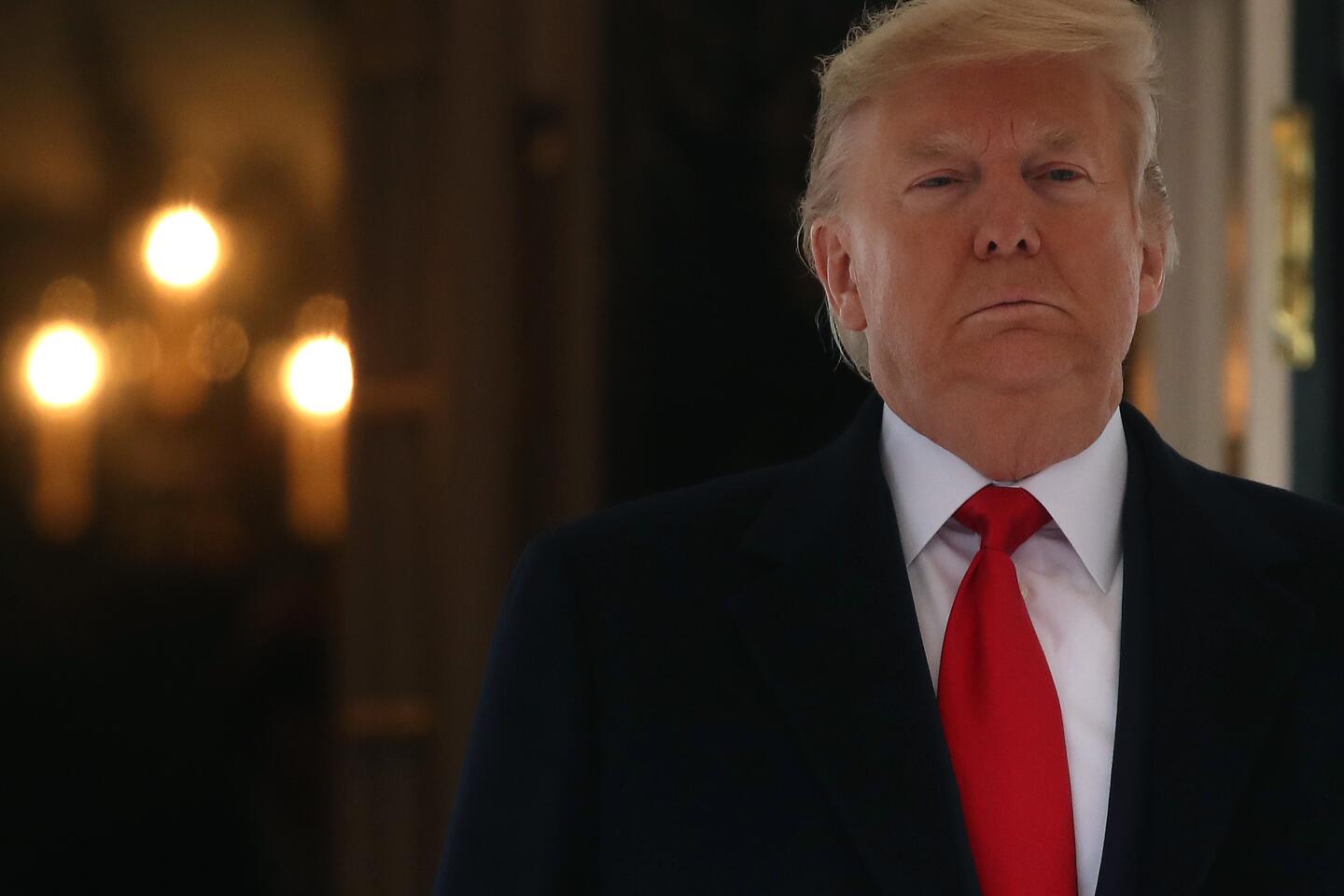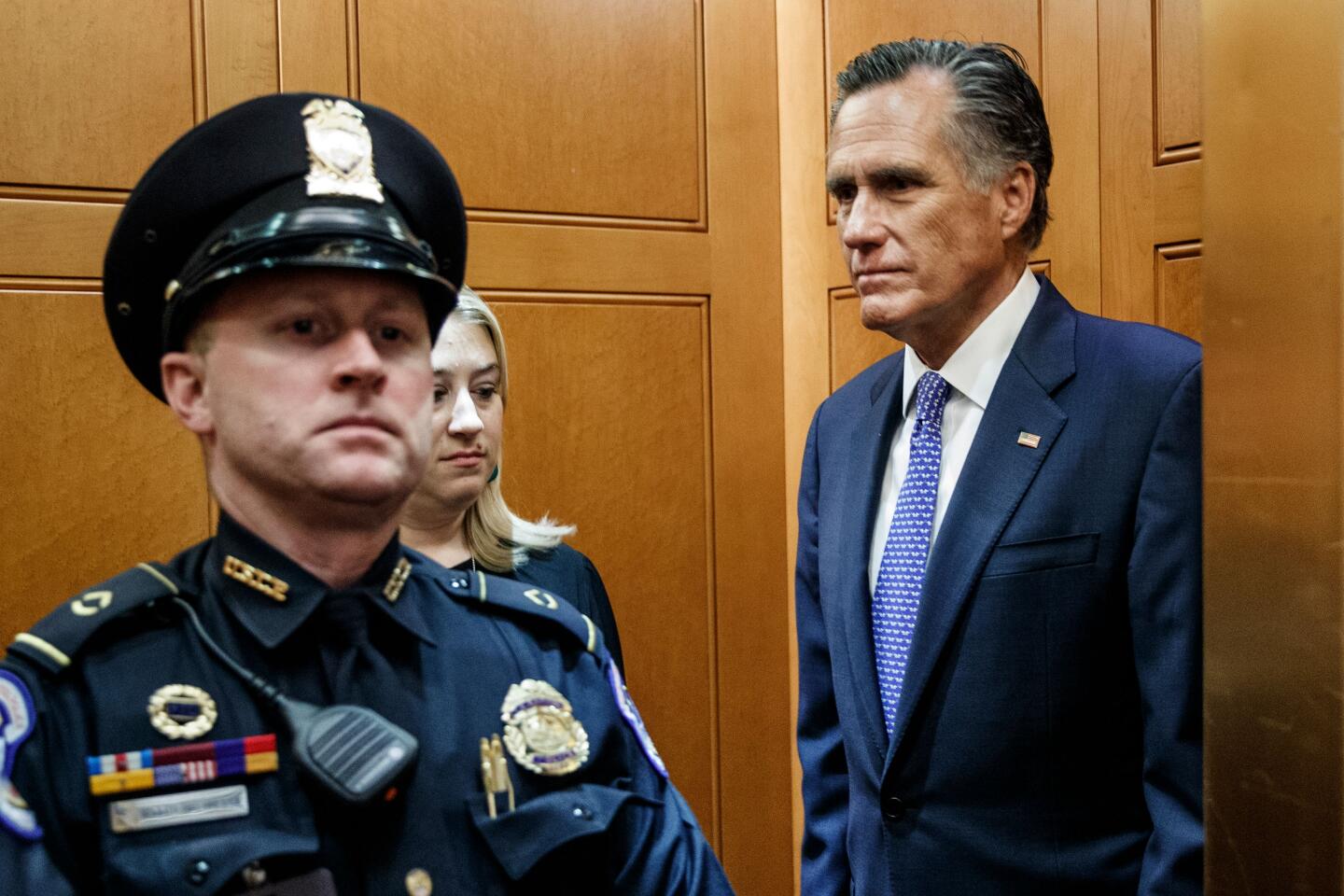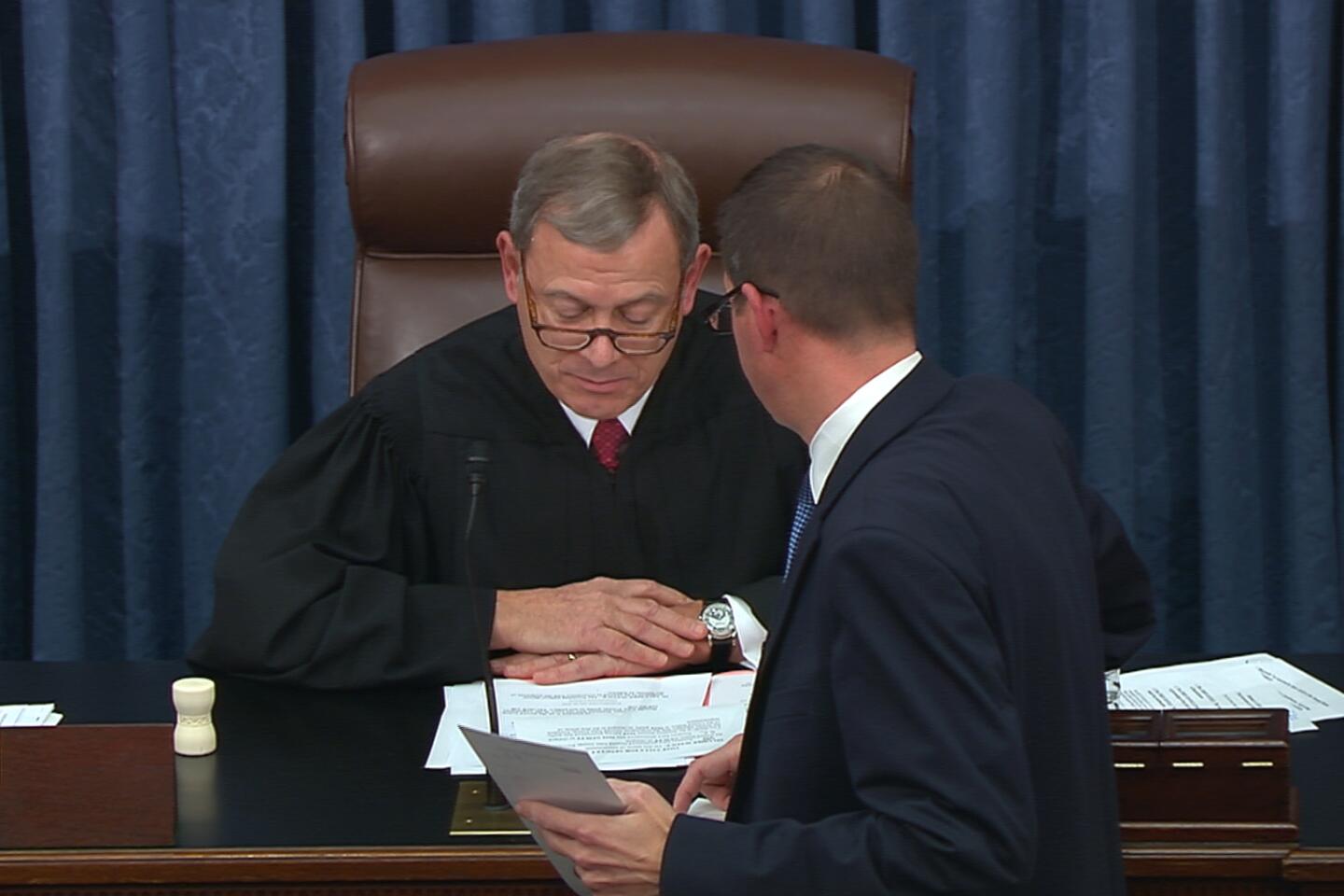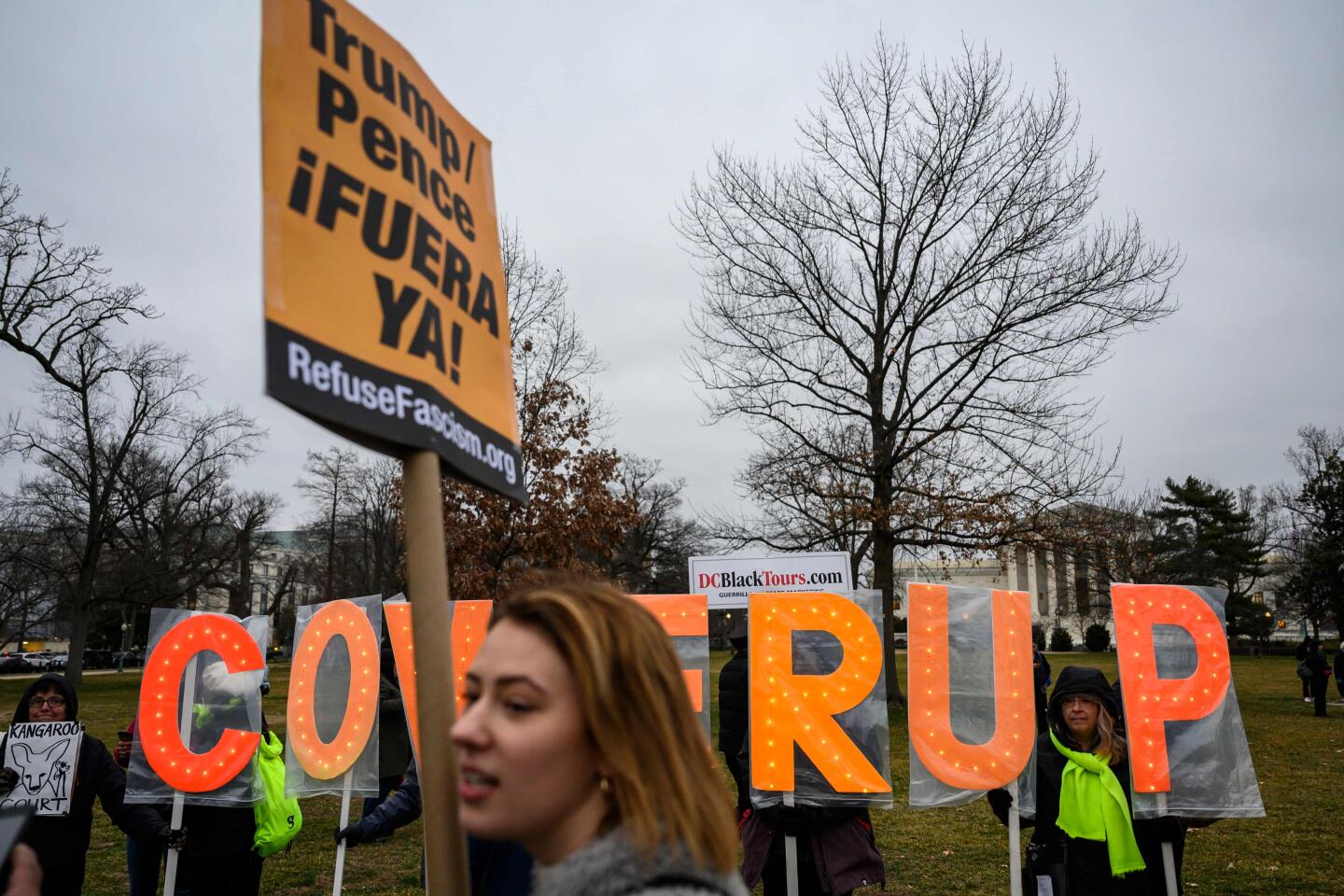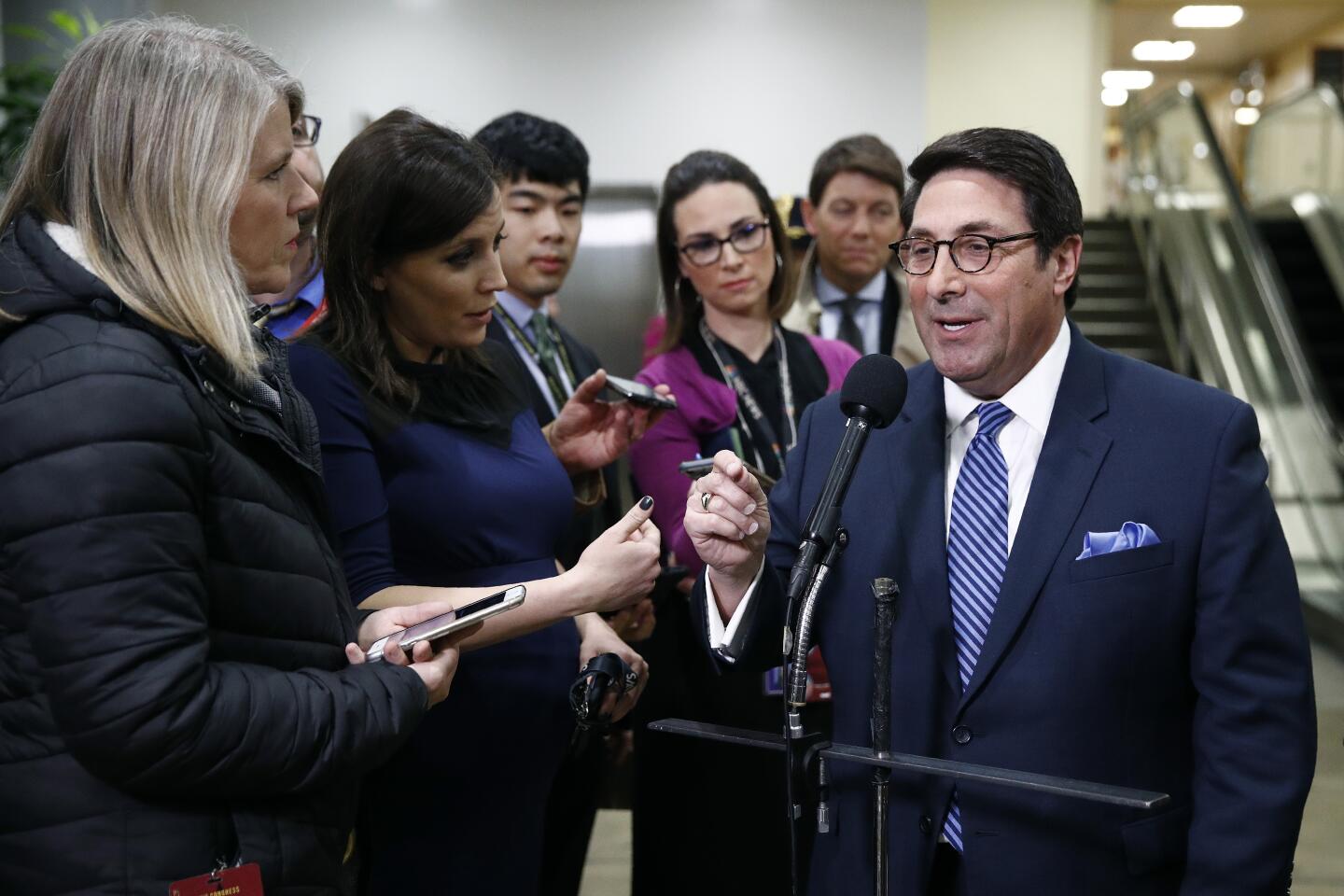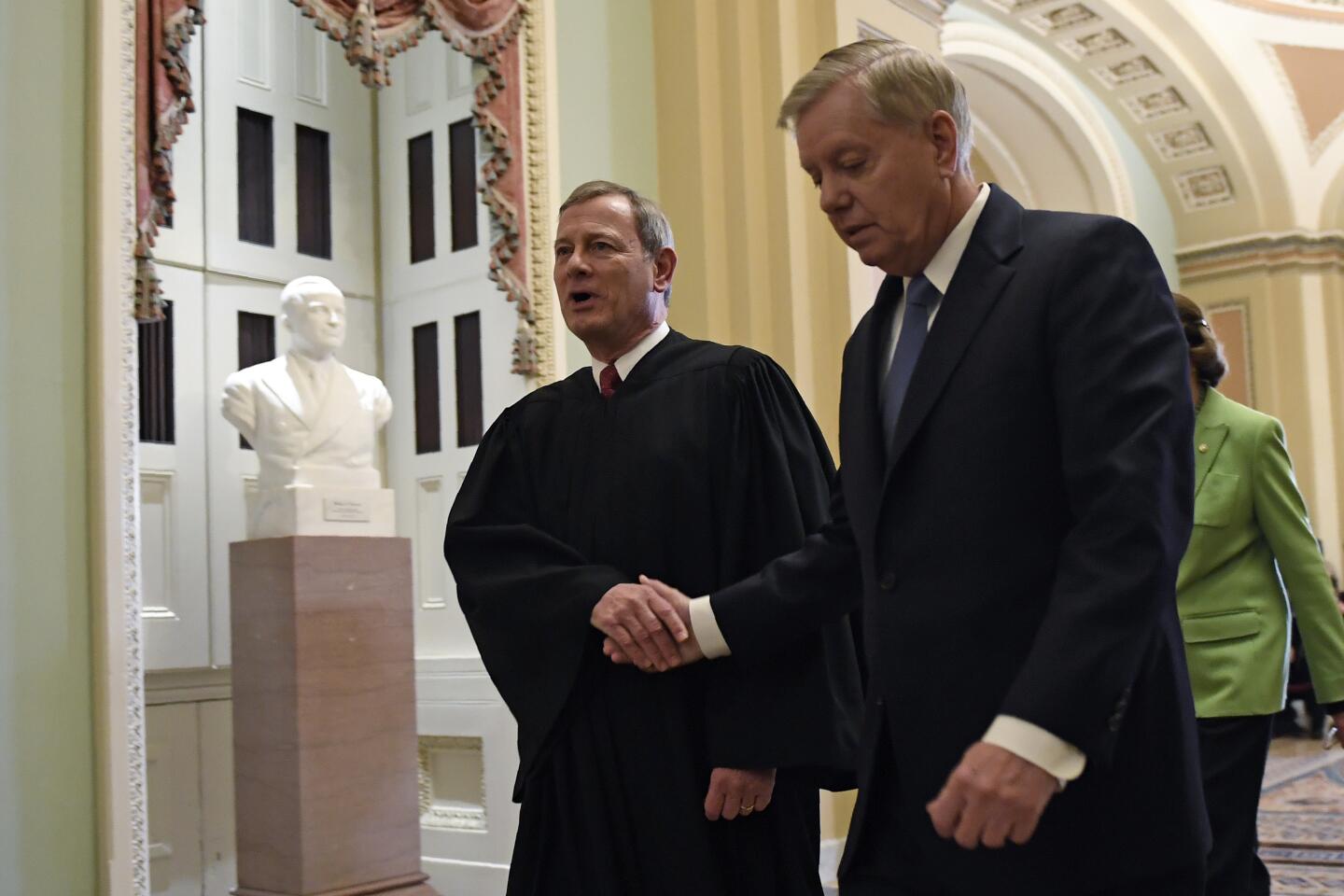Senate acquits Trump in impeachment trial; Romney breaks with GOP to vote for conviction
- Share via
WASHINGTON — The Senate on Wednesday acquitted President Trump of abusing the power of his office and obstructing Congress’ investigation into his conduct, ending the third presidential impeachment trial in American history.
Sen. Mitt Romney (R-Utah), the Republican Party’s presidential candidate eight years ago, became the only GOP lawmaker to join Democrats in voting to convict the president — on one of the articles of impeachment — for what he called “an appalling abuse of public trust.” It made for a dramatic conclusion to what both parties had expected to be a purely party-line vote.
For Trump, the Senate verdict allows him to declare victory as he turns toward a reelection bid. But unlike any president in modern history, he will run under the stigma of having been impeached by the House — a move with unknown political consequences.
Moreover, although Romney stood alone among Republicans in voting to convict Trump, he had company among his party’s senators in rejecting Trump’s repeated claim that his actions were “perfect.” More than half a dozen Republican senators have said they believe Trump’s actions regarding Ukraine — the basis of his impeachment — were wrong, although they believed the conduct should not result in his removal from office.
The Senate voted 48-52 on the first article of impeachment, abuse of power, and 47-53 on the second article, obstruction of Congress. Romney voted against the second article. Both articles required 67 votes for approval.
White House Press Secretary Stephanie Grisham declared “full vindication and exoneration of President Donald J. Trump,” adding that the votes for removal came only from “the president’s political opponents — all Democrats, and one failed Republican presidential candidate.”
Trump tweeted that he will address the nation at noon Eastern time on Thursday.
The House impeached Trump in December for withholding nearly $400 million in U.S. aid to Ukraine while pressing the country’s leaders to announce investigations into his political rivals, including former Vice President Joe Biden.
Romney became the only senator in history to vote to remove a president in the same party, a decision that sent shock waves through both parties. The move allows Democrats to claim bipartisan support — thin as it may be — and prevents the president from claiming his party was united in eschewing impeachment.
“Corrupting an election to keep oneself in office is perhaps the most abusive and destructive violation of one’s oath of office that I can imagine,” said Romney, speaking on the Senate floor before the vote.
During his closing arguments this week, lead House impeachment manager Rep. Adam B. Schiff (D-Burbank) had asked aloud if there would be even one Republican senator to vote for conviction. After Romney’s announcement, Schiff said, “there was, and it was Mitt Romney.”
“The fact that he alone had the faith and guts to do so shows just how rare a quality moral courage is,” Schiff said in an interview with the Los Angeles Times.
Romney acknowledged that he would face the wrath of the president, his party and some of his constituents.
“Does anyone seriously believe that I would consent to these consequences other than from an inescapable conviction that my oath before God demanded it of me?” he said. Later, he told Fox News it was the most difficult decision of his life. “It’s going to get very lonely,” he added, referring to the political backlash.
Schiff said that despite the loss, Democrats will remain vigilant in their oversight of the president.
“There is a risk that he becomes even more unbounded,” he said in the interview. “We succeeded in exposing his misconduct and stopping the plot, but his plotting continues and we’re going to have to be vigilant.”
The 12-day trial — overseen by Chief Justice John G. Roberts Jr. — was the shortest in presidential impeachment history, and the only one that did not include subpoenas for witnesses or documents. Democrats say that exclusion delegitimized the process.
“There is a giant asterisk next to the president’s acquittal,” said Senate Minority Leader Charles E. Schumer (D-N.Y.). “His acquittal is virtually valueless.”
Trump and the White House stonewalled the House impeachment inquiry, refusing to allow administration officials to testify or turn over documents except for a memo of a phone call between Trump and the president of Ukraine. When the issue of subpoenas came to the Senate, Majority Leader Mitch McConnell (R-Ky.) was able to keep enough of his Republicans together to oppose issuing them, arguing that the House — not the Senate — should have fought the court battle over whether Trump could block his aides from testifying.
Romney and Sen. Susan Collins of Maine were the only Republicans who voted to demand witnesses, along with all Democrats. But the motion was still two votes short of the tally required.
“I’m proud of my members for resisting the temptation to go down that path,” McConnell said after the trial ended.
Trump’s Republican allies and his lawyers blasted the process, accusing House Democrats of pursuing a partisan impeachment out of spite for the 2016 election.
“I have such strong feelings about how unfair everything is and why it’s all motivated from hate. They hate him,” said Sen. James M. Inhofe (R-Okla.) said of House Democrats who pursued the impeachment inquiry.
Other Republicans argued that the House inquiry fell short. “House managers failed to prove their case,” said Sen. Ted Cruz (R-Texas). “And for that reason the Senate rightfully acquitted President Trump.”
Sen. Susan Collins’ decision leaves Democrats with few options for bipartisan support for their impeachment push to convict and remove President Trump.
Sixty-seven votes are required in the Senate to remove an impeached president from office — a bar that Democrats knew they were unlikely to even brush up against.
Despite the loss, Democrats feel confident in the case they made in the Senate, Schiff said, insisting that voters — and history textbooks — will now make the final judgment on the case that played out on cable television for days.
“What we were able to do is speak truthfully about this president in a way that resonated with people, whether they like him or didn’t like him,” Schiff said.
He also counted as a victory the fact that several Republicans — among them Sens. Lamar Alexander of Tennessee, Ben Sasse of Nebraska, Rob Portman of Ohio and Collins — acknowledged that what the president did was wrong, even though they did not believe it warranted removal from office.
When asked whether Democrats would try to impeach the president again — as Republicans claim they will — Schiff demurred.
He declined to say whether he will subpoena John Bolton, the former national security advisor whose book manuscript allegedly recounts Trump personally demanding that aid to Ukraine be withheld until investigations into Democrats were announced. Bolton rebuffed an invitation to testify before the House, promising to go to court, but later said he would comply with a Senate subpoena.
House Judiciary Committee Chairman Jerrold Nadler (D-N.Y.) said the House is “likely” to issue the subpoena.
Although two previous presidents have been impeached — President Johnson in 1868 and President Clinton in 1998 — the Senate has never removed a president from office. President Nixon resigned when it became clear he would be removed.
Like those of Johnson and Clinton, Trump’s legacy will now include impeachment — a descriptor that even his acquittal in the Senate will not erase. He made no mention of the impeachment during his State of the Union address on Tuesday, adhering to a request made by Senate Republicans to focus instead on a new agenda in an election year.
The question facing lawmakers now is how impeachment will play in the 2020 elections, both for the presidency and Congress. Control of the closely divided Senate will be up for grabs.
McConnell declared impeachment a “political loser” for Democrats.
“The president has his highest approval rating since he’s been in office,” McConnell said. “Every one of our [senators] in tough races, every one of them, is in better shape today than they were before the impeachment trial started.”
Schumer seemed to acknowledge that polls appear to benefit Republicans right now.
“I believe that it will work out,” he said. “Poll numbers go up and down.”
Republicans on Wednesday suggested that they’ll move on to policy items in the remainder of 2020, such as a long-delayed effort to pursue a bipartisan infrastructure package or a highway funding bill, seemingly impossible tasks in the wake of the partisan impeachment trial.
Republican allies expect Trump to tout the Senate vote, but Democrats say history is on their side, pointing to the first impeached president.
“I guess Andrew Johnson was a winner at the time,” said Sen. Christopher S. Murphy (D-Conn.) of the 17th president, who survived a Senate impeachment trial but whose legacy was tarred. “I’m not sure that the broad scope of history judges Andrew Johnson a winner in that fight.”
The Senate is cleaving along party lines in advance of Wednesday’s virtually certain votes to acquit President Trump on two impeachment charges.
Times staff writer Erin B. Logan contributed to this report.
More to Read
Get the L.A. Times Politics newsletter
Deeply reported insights into legislation, politics and policy from Sacramento, Washington and beyond. In your inbox three times per week.
You may occasionally receive promotional content from the Los Angeles Times.
